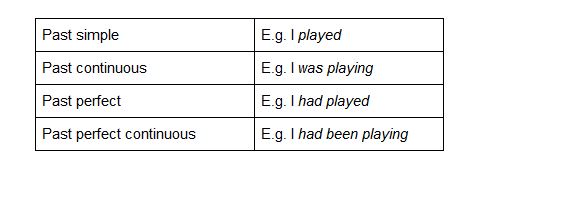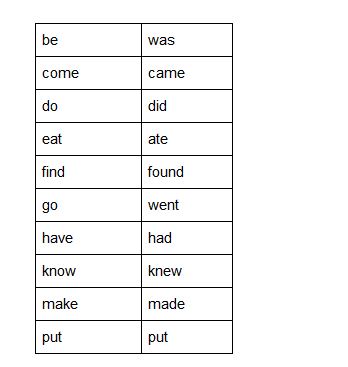set past tense: คุณกำลังดูกระทู้
Do you have difficulty with the past tenses in English? Do you know the difference between the past simple and past perfect? Knowing what they are and when to use them can be tricky, but don’t worry we are here to help you with all your past tense doubts!
We’ll show you when to use them and give you some fun ways to practise them at home!
So, let’s start by looking at the four main past tense forms in English and their most common uses.

1. Past Simple
The first past tense you’ll often learn in your English classes is the past simple.
Form
For regular verbs we add -ed to the infinitive form of the verb. E.g.


Irregular verbs however, take a different form. There are hundreds of irregular verbs and you just have to learn them off by heart! Here are some of the most common:

Use
The main use of the past simple is for finished actions in the past. For example:
- I was born in San Francisco.
- I cleaned my room.
- I forgot my key.
We can use it with a finished time phrase like in the sentences below:
- Yesterday I went to the supermarket.
- Last night we watched the football.
- The phone rang five minutes ago.
Other common time expressions you can use are:
last month, last week, last summer, in 1997, when I was a child, a long time ago, on Monday, in February etc.
We also use the past simple for the main action when telling a story.
E.g. I woke up on my wedding day, I jumped out of bed and immediately called my brother. He didn’t pick up and so I began to worry.
Let’s see how much you’ve learned!
Activity One
We are going to test your knowledge of regular and irregular verbs! Watch this cartoon of Mr Bean making spaghetti. Then have a go at conjugating the verbs below into the past simple. Finally put the sequence in order they appear in the video!
Mr. Bean:
________ (brush) his teeth
________ (try) to cook spaghetti in the pot
________ (put) the spaghetti in the bath
________ (kill) the bird
________ (take) the spaghetti out of the cupboard.
*Check your answers at the end of this post.
2. Past Continuous
Another common past tense is the past continuous.
Form
We form it using was/were + verb + ing.
Use
A common use of the past continuous is to show that a longer action was interrupted (usually by a shorter action in the past simple). We often use the time expression when. For example:
- I was swimming in the sea when I saw a shark.
- Henry was sitting at home when the phone rang.
- She was playing golf when it began to rain.
When two continuous actions are happening at the same time we use the time expression while.
- I was talking to Sarah while she was driving.
- We were playing while dad was cooking dinner.
We can also use it to show a continuous action happening at a specific time in the past.
- Yesterday morning I was practising the piano.
- At 6 o’clock I was eating dinner.
- What were you doing at 8pm last night?
Finally, it can be used to add some description to a story.
E.g. It was a beautiful day. The sun was shining and the birds were singing. We were walking around our favourite park.
Note we don’t usually use continuous tenses with stative verbs.
Now let’s practise!
Activity Two
Look at these pictures and complete the sentences with your own ideas!


*Check your answers at the end of this post
3. Past Perfect
Now we can move on to a slightly more difficult tense – the past perfect.
Form
We make the past perfect by using had + past participle.
Use
We use it when one action happens before another past action. For example:
A. The film had started when we arrived. (the film started before we arrived)
B. The film started when we arrived (we arrived at the same time the film started)
We use time expressions such as before, by the time and when.
Be careful lots of students overuse the past perfect! Remember you only use it for actions that happened before the main action.
Activity Three
Learn more about the past perfect with this grammar game show from BBC Learning English.
How many answers did you get correct?
&nhbsp;
4. Past Perfect Continuous
The past perfect continuous is very similar to the past perfect.
Form
We form the past perfect continuous with had + been + verb + ing.
Use
We use it to show that an action which started in the past continued up to another point in the past. For example:
- She had been living in Italy for three years when she lost her job.
- I had been waiting for ten minutes before the bus came.
- By the time Steve arrived I had been working for nearly eight hours!
With the past perfect we use time expressions such as for five hours, for 2 weeks, for a long time, by the time.
We can also use it to talk about the cause of something in the past. E.g.
- Susan was sweating because she had been running.
- Henry was late because he had been studying.
Note we don’t usually use continuous tenses with stative verbs.
Activity Four
Practise when to use past perfect vs. past perfect continuous with this quiz!
Choose the correct answer in each question:
1. The children were tired because they had played all morning / had been playing all morning.
2. The customers were angry because the waiter had forgotten / had been forgetting their order.
3. He had married / had been marrying her two years before we met.
4. I had never stayed / had never been staying in London until 2012.
5. We had tried / had been trying the door for several hours before Anna found her key.
*Check your answers at the end of this post.
Activity Five
Finally, put all your new knowledge to the test! Look at this photo and answer the questions below using the different past tenses. Leave us a comment below with your ideas!

Speculate
1. Where was this photo taken?
2. Why was the man looking at the people in the background when the photo was taken?
3. What had happened just before the photo was taken?
4. Where had the man been going before the photo was taken?
*Check your answers at the end of this post.
—
Did you enjoy this blog? Had you studied all these rules before reading it? Leave us a comment and let us know!
You may also like to read our article about common grammar mistakes in English.
*Answers
Activity One:
E) He took the spaghetti out of the cupboard.
B) He tried to cook spaghetti in the pot.
C) He put the spaghetti in the bath.
A) He brushed his teeth.
D) He killed the bird.
—
Activity Two (example sentences):
At 8 o’clock last night I was watching TV.
At 8 o’clock last night I was reading a book.
At 8 o’clock last night I was cooking my dinner.
It was a Wednesday afternoon, it was raining heavily, I was sitting on the bus trying not to fall asleep.
—
Activity Four:
had been playing.
had forgotten.
had married.
had never stayed.
had been trying.
—
Activity Five (example sentences):
The photo was taken in a hotel.
The man was looking at the people in the background because he thought he recognised one of the women.
Just before the photo was taken the man had gone to the kitchen to get a drink of water.
The man had been walking back to his room before the photo was taken.
Glossary for Language Learners
Find the following words in the article and then write down any new ones you didn’t know.
Tricky (adj):: difficult.
Off by heart (exp): from memory.
To conjugate (v): to add different endings to a verb in order to produce all its different forms.
To move on (pv): to transition to something new.
Overuse (v): to use something too much.
Game show (n): a television programme where contestants win prizes.
Speculate (v): to guess possible answers to a question when you do not have enough information to be certain.
Key
adj = adjective
pv = phrasal verb
v = verb
n = noun
exp = expression
Study English at Oxford House Barcelona
Interested in taking an English course at Oxford House Barcelona? Check all the different
Interested in taking an English course at Oxford House Barcelona? Check all the different English classes we can offer you, or our summer courses , and contact us for more information.
[Update] Simple Past Tense | set past tense – NATAVIGUIDES
The simple past is a verb tense that is used to talk about things that happened or existed before now. Imagine someone asks what your brother Wolfgang did while he was in town last weekend.
Wolfgang entered a hula hoop contest.
He won the silver medal.
Here’s a tip: Want to make sure your writing always looks great? Grammarly can save you from misspellings, grammatical and punctuation mistakes, and other writing issues on all your favorite websites.
The simple past tense shows that you are talking about something that has already happened. Unlike the past continuous tense, which is used to talk about past events that happened over a period of time, the simple past tense emphasizes that the action is finished.
The simple past tense shows that you are talking about something that has already happened. Unlike the past continuous tense, which is used to talk about past events that happened over a period of time, the simple past tense emphasizes that the action is finished.
Wolfgang admired the way the light glinted off his silver medal.
You can also use the simple past to talk about a past state of being, such as the way someone felt about something. This is often expressed with the simple past tense of the verb to be and an adjective, noun, or prepositional phrase.
Wolfgang was proud of his hula hoop victory.
The contest was the highlight of his week.
How to Formulate the Simple Past
For regular verbs, add -ed to the root form of the verb (or just -d if the root form already ends in an e):
Play→Played
Type→Typed
Listen→Listened
Push→Pushed
Love→Loved
For irregular verbs, things get more complicated. The simple past tense of some irregular verbs looks exactly like the root form:
Put→Put
Cut→Cut
Set→Set
Cost→Cost
Hit→Hit
For other irregular verbs, including the verb to be, the simple past forms are more erratic:
See→Saw
Build→Built
Go→Went
Do→Did
Rise→Rose
Am/Is/Are→Was/Were
The good news is that verbs in the simple past tense (except for the verb to be) don’t need to agree in number with their subjects.
Wolfgang polished his medal. The other winners polished their medals too.
How to Make the Simple Past Negative
Fortunately, there is a formula for making simple past verbs negative, and it’s the same for both regular and irregular verbs (except for the verb to be). The formula is did not + [root form of verb]. You can also use the contraction didn’t instead of did not.
Wolfgang did not brag too much about his hula hoop skills.
Wolfgang’s girlfriend didn’t see the contest.
For the verb to be, you don’t need the auxiliary . When the subject of the sentence is singular, use was not or wasn’t. When the subject is plural, use were not or weren’t.
The third-place winner was not as happy as Wolfgang.
The fourth-place winner wasn’t happy at all.
The onlookers were not ready to leave after the contest ended.
The contestants weren’t ready to leave either.
How to Ask a Question
The formula for asking a question in the simple past tense is did + [subject] + [root form of verb].
Did Wolfgang win the gold medal or the silver medal?
Where did Wolfgang go to celebrate?
Did the judges decide fairly, in your opinion?
When asking a question with the verb to be, you don’t need the auxiliary . The formula is was/were + [subject].
Was Wolfgang in a good mood after the contest?
Were people taking lots of pictures?
Common Regular Verbs in the Past Tense
Common Irregular Verbs in the Past Tense
We’d Been Hoping for a Romantic Trip – Past Perfect Continuous
Learn how to use the past perfect continuous tense (also known as the past perfect progressive tense) to express an action that started in the past and continued until a later time in the past.
นอกจากการดูบทความนี้แล้ว คุณยังสามารถดูข้อมูลที่เป็นประโยชน์อื่นๆ อีกมากมายที่เราให้ไว้ที่นี่: ดูเพิ่มเติม

Past Participle Verbs

How to ask questions in the PAST SIMPLE tense
Ready to master the most used tense in English conversations? In this easy grammar lesson you’ll learn to ask questions in the past simple tense. We use this tense more than others because when we have a conversation or tell a story, we are usually talking about something that happened in the past. Unfortunately, many English learners make simple mistakes when they ask questions in the past simple tense. Watch this video for a clear explanation of all the rules you need to follow. Then we’ll do some exercises together so you can practice changing statements into questions. In this lesson, I also mention irregular verbs. You can view online, download, or print a list of the most common irregular verbs in English at http://www.engvid.com/englishresource/irregularverbs/
Take the quiz on this lesson here: http://www.engvid.com/howtoaskquestionsinthepastsimpletense/
TRANSCRIPT
Hi. I’m Rebecca from engVid. If you’re a beginner or intermediate level student, this is a really important lesson for you, and that’s because we’re going to focus on the past simple tense, and specifically on making questions or forming questions in the past simple tense.
Now, why are these two areas specifically a little bit more challenging for students? For two reasons. First of all, when we’re talking about the past tense, it’s a little bit more challenging because we have to deal with regular verbs and irregular verbs, and when we’re talking about questions it’s a little bit harder because we have to add some words when we form a question and we have to change other words. All right? And all of this we have to do quite a lot when we speak in English, because most of the time when you speak in English or when you speak probably in any language, we tend to talk more about the past than about anything else. So, certainly, when we speak in English, we use this tense very, very often. Okay? So, let’s have a look at exactly how to make these changes so that you can ask questions in the past simple tense very easily. Okay.
So, first of all, let’s look at the sentence. When we form a sentence using a regular verb in the past, so what we do is we take the base verb, which in this first case is \”work\”, and we add \”ed\” or \”d\”. Okay? If the verb already ends in \”e\”, like \”dance\”, then we just add a \”d\”; and if not, we add \”ed\”. So: \”He worked\”, right? \”He worked\”, \”work\” becomes \”worked\”. But what happens when we need to make the question? Two things. First, you have to add this extra word: \”Did\”. Without that, your question, I guarantee you, will be wrong. It might be casual, it might be informal, but it will grammatically be incorrect. So we need that word \”Did\” to form the question, and then we have to make another change. We have to add this: \”Did he work?\” So what happened? Here, when we had the sentence, we had to write \”ed\”, and we said: \”He worked.\” But when we come back to the question, we are coming back to the base form off the verb, so we do not say: \”Did he worked?\” We just say: \”Did he work?\” All right? So try to get the rhythm of that. And I’ll try to repeat it for you, too, which you can then listen to and repeat after me. So, for example: \”He worked.\”, \”Did he work?\”, \”She played.\”, \”Did she play?\”, \”They visited.\”, \”Did they visit?\” All right? You see? In each case, we have come back to the base form of the verb. So, do not say: \”Did he worked?\” Don’t say: \”He worked?\” Try to use the entire expression: \”Did he work?\”, \”Did she play?\”, \”Did they visit?\” Okay? That’s with regular verbs.
Now, what happens when we have irregular verbs? Well, you have to learn a little bit more. First, you have to learn: What is the past tense form to use with those irregular verbs? So, for example, in this one, the verb itself is the verb \”go\”. \”I go.\” Or let’s say: \”He goes.\” But in the past, you have to know that the past tense form of \”go\” is \”went\”. All right? How do you know that? Well, you just have to learn it. Okay? There’s no other way. There’s a list of irregular verbs, and then you have to learn them by heart, you probably know many of them because you hear them a lot, but otherwise, you have to learn them. There’s not much choice, there. Okay?
So in the past: \”He went.\” How do we make that into a question, and what happens? The same thing that happened up here with the regular verbs. So: \”He went.\” becomes: \”Did he go?\” All right? So let’s see. \”He went to the store.\” When we ask the question, we say: \”Did he go to the store?\” All right? So, again, we had to add the word \”did\”, and we have to come back to the base form of the verb, which in this case was \”go\”. All right?

What Did You Do? Simple Past Tense
Learn how to talk about your day or about your weekend and how to ask questions using Past Tense Verbs.

[Past tense] What did you do? – Easy Dialogue – Role Play
https://www.youtube.com/user/englishsingsing9
[Past tense] What did you do? Easy Dialogue Role Play
Here is Great Educational Songs \u0026 Animations for kids, toddlers, children, babies and EVERYONE!
Please enjoy watching fun \u0026 exciting English animation!
★ Subscribe us on YouTube: http://goo.gl/gDa963
★ More Our Dialogue: https://goo.gl/ByGXT2
Title: What did you do?
Good morning, Sally. How are you?
I’m great. What did you do yesterday?
We went to the park.
What did you do in the park?
We flew kites. His kites flew high.
Wow! You’re good.
What did you do yesterday, Sally?
I read books.
Let’s go to the classroom.
What did you do yesterday?
I watched a science movie.
What did you do yesterday, Mike?
I made bulgogi with my dad.
How was it?
It was very delicious. We had a bulgogi party.
I made cookies yesterday. I brought cookies for you.
Thanks! Mm, delicious!
Thanks for checking out the \”English Singsing\”.
© Amanta Inc.
![[Past tense] What did you do? - Easy Dialogue - Role Play](https://i.ytimg.com/vi/pcWBtzTnpb8/maxresdefault.jpg)
นอกจากการดูบทความนี้แล้ว คุณยังสามารถดูข้อมูลที่เป็นประโยชน์อื่นๆ อีกมากมายที่เราให้ไว้ที่นี่: ดูบทความเพิ่มเติมในหมวดหมู่LEARN FOREIGN LANGUAGE
ขอบคุณที่รับชมกระทู้ครับ set past tense